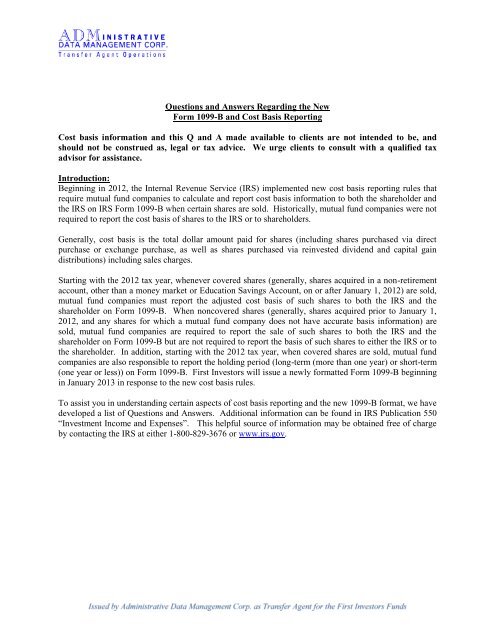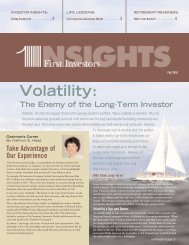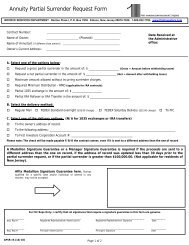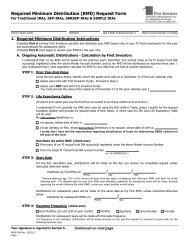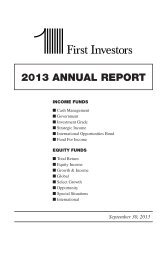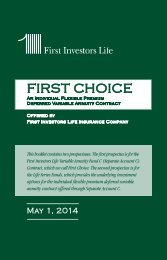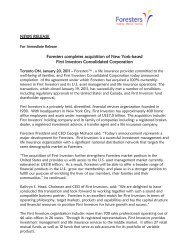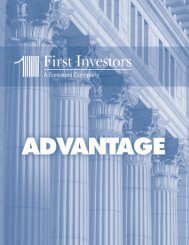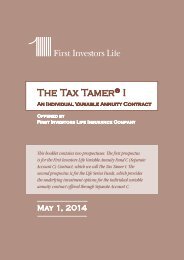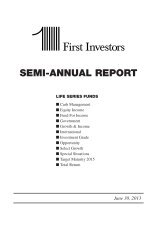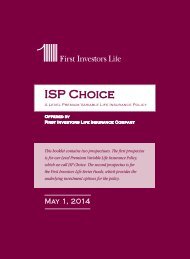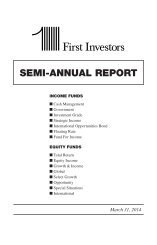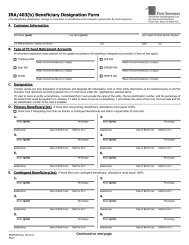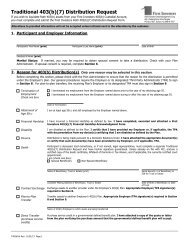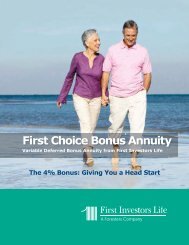A Q&A regarding the new Form 1099-B and cost ... - First Investors
A Q&A regarding the new Form 1099-B and cost ... - First Investors
A Q&A regarding the new Form 1099-B and cost ... - First Investors
Create successful ePaper yourself
Turn your PDF publications into a flip-book with our unique Google optimized e-Paper software.
Questions <strong>and</strong> Answers Regarding <strong>the</strong> New<br />
<strong>Form</strong> <strong>1099</strong>-B <strong>and</strong> Cost Basis Reporting<br />
Cost basis information <strong>and</strong> this Q <strong>and</strong> A made available to clients are not intended to be, <strong>and</strong><br />
should not be construed as, legal or tax advice. We urge clients to consult with a qualified tax<br />
advisor for assistance.<br />
Introduction:<br />
Beginning in 2012, <strong>the</strong> Internal Revenue Service (IRS) implemented <strong>new</strong> <strong>cost</strong> basis reporting rules that<br />
require mutual fund companies to calculate <strong>and</strong> report <strong>cost</strong> basis information to both <strong>the</strong> shareholder <strong>and</strong><br />
<strong>the</strong> IRS on IRS <strong>Form</strong> <strong>1099</strong>-B when certain shares are sold. Historically, mutual fund companies were not<br />
required to report <strong>the</strong> <strong>cost</strong> basis of shares to <strong>the</strong> IRS or to shareholders.<br />
Generally, <strong>cost</strong> basis is <strong>the</strong> total dollar amount paid for shares (including shares purchased via direct<br />
purchase or exchange purchase, as well as shares purchased via reinvested dividend <strong>and</strong> capital gain<br />
distributions) including sales charges.<br />
Starting with <strong>the</strong> 2012 tax year, whenever covered shares (generally, shares acquired in a non-retirement<br />
account, o<strong>the</strong>r than a money market or Education Savings Account, on or after January 1, 2012) are sold,<br />
mutual fund companies must report <strong>the</strong> adjusted <strong>cost</strong> basis of such shares to both <strong>the</strong> IRS <strong>and</strong> <strong>the</strong><br />
shareholder on <strong>Form</strong> <strong>1099</strong>-B. When noncovered shares (generally, shares acquired prior to January 1,<br />
2012, <strong>and</strong> any shares for which a mutual fund company does not have accurate basis information) are<br />
sold, mutual fund companies are required to report <strong>the</strong> sale of such shares to both <strong>the</strong> IRS <strong>and</strong> <strong>the</strong><br />
shareholder on <strong>Form</strong> <strong>1099</strong>-B but are not required to report <strong>the</strong> basis of such shares to ei<strong>the</strong>r <strong>the</strong> IRS or to<br />
<strong>the</strong> shareholder. In addition, starting with <strong>the</strong> 2012 tax year, when covered shares are sold, mutual fund<br />
companies are also responsible to report <strong>the</strong> holding period (long-term (more than one year) or short-term<br />
(one year or less)) on <strong>Form</strong> <strong>1099</strong>-B. <strong>First</strong> <strong>Investors</strong> will issue a <strong>new</strong>ly formatted <strong>Form</strong> <strong>1099</strong>-B beginning<br />
in January 2013 in response to <strong>the</strong> <strong>new</strong> <strong>cost</strong> basis rules.<br />
To assist you in underst<strong>and</strong>ing certain aspects of <strong>cost</strong> basis reporting <strong>and</strong> <strong>the</strong> <strong>new</strong> <strong>1099</strong>-B format, we have<br />
developed a list of Questions <strong>and</strong> Answers. Additional information can be found in IRS Publication 550<br />
“Investment Income <strong>and</strong> Expenses”. This helpful source of information may be obtained free of charge<br />
by contacting <strong>the</strong> IRS at ei<strong>the</strong>r 1-800-829-3676 or www.irs.gov.
Questions<br />
1. Why have <strong>cost</strong> basis reporting requirements been changed ....................................... 4<br />
2. Is <strong>the</strong> calculation of <strong>cost</strong> basis a <strong>new</strong> requirement for shareholders .......................... 4<br />
3. What types of accounts are subject to <strong>Form</strong> <strong>1099</strong>-B/<strong>cost</strong> basis reporting ................. 4<br />
4. Where do I report <strong>cost</strong> basis information on my tax form ......................................... 4<br />
5. What are covered shares ................................................................................................ 4<br />
6. What are noncovered shares .......................................................................................... 4<br />
7. Why do I own both covered <strong>and</strong> noncovered shares <strong>and</strong>, if average <strong>cost</strong> applies, why<br />
do <strong>the</strong>y have a different average <strong>cost</strong> per share ........................................................... 4<br />
8. Can I choose to have all of <strong>the</strong> shares in an account treated as covered shares........ 4<br />
9. What is adjusted basis .................................................................................................... 5<br />
10. What is a wash sale ......................................................................................................... 5<br />
11. What is different about <strong>the</strong> <strong>new</strong> format ........................................................................ 5<br />
12. What do <strong>the</strong> five categories on <strong>the</strong> <strong>1099</strong>-B mean ......................................................... 5<br />
13. What <strong>cost</strong> basis methods does <strong>First</strong> <strong>Investors</strong> offer ..................................................... 6<br />
14. What is <strong>First</strong> <strong>Investors</strong>’ default <strong>cost</strong> basis method ...................................................... 7<br />
15. How can I elect a <strong>cost</strong> basis method o<strong>the</strong>r than average <strong>cost</strong> ..................................... 7<br />
16. Will my <strong>cost</strong> basis election be coded at <strong>the</strong> fund, customer or master level .............. 7<br />
17. Who should I contact for assistance in determining which <strong>cost</strong> basis method to use7<br />
18. Can <strong>First</strong> <strong>Investors</strong> determine which <strong>cost</strong> basis method will reduce my taxes ......... 7<br />
19. What method was used to sell my shares ...................................................................... 7<br />
20. If I have multiple accounts with different customer numbers, such as Individual<br />
accounts <strong>and</strong> UGMA accounts, will I be able to elect different <strong>cost</strong> basis methods for<br />
<strong>the</strong> different customer numbers Are multiple election forms needed ...................... 7<br />
21. How is <strong>the</strong> holding period determined for shares that are sold at an average <strong>cost</strong> .. 7<br />
22. How is <strong>the</strong> average <strong>cost</strong> calculated for an account that contains covered <strong>and</strong><br />
noncovered shares ........................................................................................................... 8<br />
23. Why would <strong>First</strong> <strong>Investors</strong> have shares for which <strong>the</strong>y are unable to determine<br />
accurate <strong>cost</strong> basis information ..................................................................................... 8<br />
24. Can <strong>First</strong> <strong>Investors</strong> assist me with calculating <strong>cost</strong> information in cases where my<br />
<strong>1099</strong>-B does not indicate a <strong>cost</strong> or o<strong>the</strong>r basis amount ................................................ 8<br />
25. Can I change <strong>the</strong> <strong>cost</strong> basis method for shares remaining in an account after covered<br />
shares have been sold ...................................................................................................... 8<br />
26. Can I change my <strong>cost</strong> basis method for past sales of covered shares ......................... 8<br />
27. I received <strong>Form</strong> <strong>1099</strong>-B <strong>and</strong> my accountant advised that I would have been better<br />
off selling shares using a method o<strong>the</strong>r than average <strong>cost</strong>. Can you send me a<br />
corrected <strong>Form</strong> <strong>1099</strong>-B reflecting different <strong>cost</strong> basis information ........................... 8
28. I redeemed some of <strong>the</strong> covered shares in my account using <strong>the</strong> average <strong>cost</strong> method<br />
<strong>and</strong> want to choose a different <strong>cost</strong> basis method for <strong>the</strong> remaining shares in <strong>the</strong><br />
account. Can I do this .................................................................................................... 9<br />
29. How will this affect my Systematic Withdrawals......................................................... 9<br />
30. I redeemed from two different <strong>First</strong> <strong>Investors</strong> accounts. I received my <strong>1099</strong>-B for<br />
one account but did not receive a <strong>1099</strong>-B for <strong>the</strong> o<strong>the</strong>r. When will I receive <strong>the</strong><br />
o<strong>the</strong>r <strong>1099</strong>-B .................................................................................................................... 9<br />
31. My <strong>Form</strong> <strong>1099</strong>-B indicates that noncovered shares were sold. Can I rely on <strong>the</strong> <strong>cost</strong><br />
basis information provided by <strong>First</strong> <strong>Investors</strong> ............................................................. 9<br />
32. I sold noncovered shares using a method o<strong>the</strong>r than average <strong>cost</strong>. <strong>Form</strong> <strong>1099</strong>-B<br />
indicates <strong>the</strong> <strong>cost</strong> of <strong>the</strong> shares using <strong>the</strong> average <strong>cost</strong>. Can you correct <strong>the</strong> <strong>1099</strong> to<br />
reflect <strong>the</strong> shares being sold using a different method ................................................ 9<br />
33. I disagree with <strong>the</strong> basis amount shown on <strong>Form</strong> <strong>1099</strong>-B; what should I do ............ 9<br />
34. Are adjustments to <strong>the</strong> <strong>cost</strong> basis figures reported on <strong>Form</strong> <strong>1099</strong>-B ever necessary<br />
........................................................................................................................................... 10<br />
35. <strong>First</strong> <strong>Investors</strong> never reported wash sales before. Why is <strong>First</strong> <strong>Investors</strong> reporting<br />
wash sales now ............................................................................................................... 10<br />
36. I have not reported any wash sales in previous years. What should I do ............... 10<br />
37. I received <strong>Form</strong> <strong>1099</strong>-B <strong>and</strong> my accountant advised I need to adjust basis for a wash<br />
sale in ano<strong>the</strong>r account. Can you send a corrected <strong>Form</strong> <strong>1099</strong>-B reflecting different<br />
<strong>cost</strong> basis information ................................................................................................... 10<br />
38. Are reinvested dividends <strong>and</strong> capital gains considered purchases for <strong>cost</strong> basis ... 10<br />
39. How is <strong>cost</strong> basis calculated in cases when shares are acquired via a transfer from<br />
an account registered UTMA/UGMA to <strong>the</strong> minor once <strong>the</strong> minor reaches <strong>the</strong> age of<br />
majority .......................................................................................................................... 10<br />
40. How are accounts registered to S Corporations impacted ........................................ 10<br />
41. How does a corporate entity determine if it is a C or S corporation........................ 10<br />
42. I paid a CDSC from a sale of shares. How does this affect <strong>the</strong> gain/loss calculation<br />
for <strong>the</strong> sale ...................................................................................................................... 11<br />
43. Where can I obtain additional information <strong>regarding</strong> <strong>cost</strong> basis reporting............ 11<br />
44. Why didn’t I receive an Average Cost Basis Statement for a redemption .............. 11
1. Why have <strong>cost</strong> basis reporting requirements been changed<br />
The requirements for reporting <strong>cost</strong> basis information to <strong>the</strong> IRS have been changed by <strong>the</strong> IRS in an<br />
effort to reduce <strong>the</strong> underpayment of capital gains taxes. The misplacement of records for long-held<br />
investments, as well as incomplete records <strong>regarding</strong> shares received as a gift or inheritance, can lead<br />
to incorrect reporting of a shareholder’s <strong>cost</strong> basis. The <strong>new</strong> requirements are intended by <strong>the</strong> IRS to<br />
alleviate such errors for purchases made after <strong>the</strong> effective date.<br />
Return to Top<br />
2. Is <strong>the</strong> calculation of <strong>cost</strong> basis a <strong>new</strong> requirement for shareholders<br />
No. Shareholders have historically been required to calculate <strong>the</strong>ir <strong>cost</strong> basis <strong>and</strong> report capital gains<br />
or losses on Schedule D of <strong>the</strong>ir Federal <strong>Form</strong> 1040. In addition, shareholders have been required to<br />
report whe<strong>the</strong>r shares sold were held long-term or short-term.<br />
Return to Top<br />
3. What types of accounts are subject to <strong>Form</strong> <strong>1099</strong>-B/<strong>cost</strong> basis reporting<br />
Generally, most non-retirement accounts, excluding money market <strong>and</strong> Education Savings Accounts,<br />
are subject to <strong>Form</strong> <strong>1099</strong>-B/<strong>cost</strong> basis reporting.<br />
Return to Top<br />
4. Where do I report <strong>cost</strong> basis information on my tax form<br />
Cost basis information is generally reported on IRS <strong>Form</strong> 8949 <strong>and</strong> Schedule D of IRS <strong>Form</strong> 1040.<br />
Your qualified tax advisor can offer assistance in this regard.<br />
Return to Top<br />
5. What are covered shares<br />
Covered shares are those shares that are “covered” by <strong>the</strong> <strong>new</strong> reporting requirements. Covered<br />
shares are generally shares acquired in a non-retirement account, o<strong>the</strong>r than a money market or<br />
Education Savings Account, on or after January 1, 2012, for which a mutual fund company has<br />
accurate basis information.<br />
Return to Top<br />
6. What are noncovered shares<br />
Noncovered shares are those shares that are not “covered” by <strong>the</strong> <strong>new</strong> reporting requirements.<br />
Noncovered shares are generally shares acquired prior to January 1, 2012 <strong>and</strong> any shares for which a<br />
mutual fund company does not have accurate basis information.<br />
Return to Top<br />
7. Why do I own both covered <strong>and</strong> noncovered shares <strong>and</strong>, if average <strong>cost</strong> applies, why do <strong>the</strong>y<br />
have a different average <strong>cost</strong> per share<br />
Return to Top<br />
8. Can I choose to have all of <strong>the</strong> shares in an account treated as covered shares<br />
No, you cannot make an election to have <strong>First</strong> <strong>Investors</strong> treat all shares in an account as covered<br />
shares.<br />
Return to Top
9. What is adjusted basis<br />
Adjusted basis is <strong>the</strong> basis of shares after taking into account any adjustments to <strong>the</strong> original <strong>cost</strong><br />
basis as required by federal law. Adjusted basis is used to calculate <strong>the</strong> gain or loss when shares are<br />
sold or exchanged. The original <strong>cost</strong> basis may be adjusted for fund mergers, wash sales, load charge<br />
deferral (“Load Basis Deferral Rule”) <strong>and</strong> o<strong>the</strong>r transactions as applicable. In certain cases, mutual<br />
funds are not required to, or may not have <strong>the</strong> information necessary to, properly adjust <strong>the</strong> basis of<br />
shares. In <strong>the</strong>se instances you may need to make adjustments to <strong>the</strong> basis amount reported on <strong>Form</strong><br />
<strong>1099</strong>-B.<br />
Return to Top<br />
10. What is a wash sale<br />
A wash sale occurs when shares are sold at a loss <strong>and</strong> all or a portion of shares in <strong>the</strong> same fund are<br />
purchased within a 61-day period (including shares purchased as <strong>the</strong> result of dividend reinvestment),<br />
beginning 30 days before <strong>and</strong> ending 30 days after <strong>the</strong> date of <strong>the</strong> redemption. Pursuant to IRS<br />
regulations, <strong>the</strong> losses from wash sales cannot be deducted. Instead, <strong>the</strong> loss is added to <strong>the</strong> <strong>cost</strong> of <strong>the</strong><br />
purchased shares that triggered <strong>the</strong> wash sale. This adjustment postpones <strong>the</strong> loss deduction until <strong>the</strong><br />
purchased shares that triggered <strong>the</strong> wash sale are sold. The holding period for <strong>the</strong> purchased shares<br />
that triggered <strong>the</strong> wash sale is adjusted to include <strong>the</strong> holding period of <strong>the</strong> shares sold. The amount of<br />
<strong>the</strong> loss that cannot be deducted is referred to as a “disallowed loss” <strong>and</strong> is reported in box 5 of <strong>Form</strong><br />
<strong>1099</strong>-B.<br />
Return to Top<br />
11. What is different about <strong>the</strong> <strong>new</strong> format<br />
To accommodate <strong>new</strong> reporting requirements, starting with <strong>1099</strong>-Bs issued in 2013 for <strong>the</strong> 2012 tax<br />
year, <strong>1099</strong>-B information will be broken out into 5 separate categories:<br />
Long-term transactions for which basis is not reported to <strong>the</strong> IRS<br />
Short-term transactions for which basis is not reported to <strong>the</strong> IRS<br />
Long-term transactions for which basis is reported to <strong>the</strong> IRS<br />
Short-term transactions for which basis is reported to <strong>the</strong> IRS<br />
Transactions for which basis is not reported to <strong>the</strong> IRS <strong>and</strong> for which Short- or Long-Term basis is<br />
unknown to Broker<br />
Depending on shares sold, you may receive basis information which falls into one or more of <strong>the</strong><br />
above categories. The information reflected on <strong>Form</strong> <strong>1099</strong>-B may not take into consideration<br />
additional basis adjustments you are required to make, such as wash sale adjustments between<br />
accounts.<br />
Return to Top<br />
12. What do <strong>the</strong> five categories on <strong>the</strong> <strong>1099</strong>-B mean<br />
Long-term transactions for which basis is not reported to <strong>the</strong> IRS:<br />
This category will be used in cases where noncovered shares are sold or exchanged <strong>and</strong> we are able to<br />
determine that such shares have been held for more than 1 year. This determination is made without<br />
consideration for any adjustments to holding period you may be required to make for transactions<br />
such as wash sales. The <strong>cost</strong> basis information shown in this category was derived using <strong>the</strong> average<br />
<strong>cost</strong> of shares sold. The <strong>cost</strong> basis amount shown in this category will not be reported to <strong>the</strong> IRS.<br />
Short-term transactions for which basis in not reported to <strong>the</strong> IRS:<br />
This category will be used in cases where noncovered shares are sold or exchanged <strong>and</strong> we are able to<br />
determine that such shares have been held 1 year or less. This determination is made without<br />
consideration for any adjustments to holding period you may be required to make for transactions<br />
such as wash sales. The <strong>cost</strong> basis information shown in this category was derived using <strong>the</strong> average<br />
<strong>cost</strong> of shares sold. The <strong>cost</strong> basis information shown in this category will not be reported to <strong>the</strong> IRS.
Long-term transactions for which basis is reported to <strong>the</strong> IRS:<br />
This category will be used in cases where covered shares are sold or exchanged <strong>and</strong> we are able to<br />
determine that such shares have been held for more than 1 year. The <strong>cost</strong> basis information shown in<br />
this category was derived using <strong>the</strong> average <strong>cost</strong> of covered shares sold, unless you previously<br />
notified us to use a method o<strong>the</strong>r than average <strong>cost</strong>; in such case, <strong>the</strong> actual <strong>cost</strong> of covered shares<br />
sold is reflected. The <strong>cost</strong> basis information shown in this category will be reported to <strong>the</strong> IRS.<br />
Short-term transactions for which basis is reported to <strong>the</strong> IRS:<br />
This category will be used in cases where covered shares are sold or exchanged <strong>and</strong> we are able to<br />
determine that such shares have been held 1 year or less. The <strong>cost</strong> basis information shown in this<br />
category was derived using <strong>the</strong> average <strong>cost</strong> of covered shares sold, unless you previously notified us<br />
to use a method o<strong>the</strong>r than average <strong>cost</strong>; in such case, <strong>the</strong> actual <strong>cost</strong> of covered shares sold is<br />
reflected. The <strong>cost</strong> basis information shown in this category will be reported to <strong>the</strong> IRS.<br />
Transactions for which basis is not reported to <strong>the</strong> IRS <strong>and</strong> for which Short- or Long-Term basis is<br />
unknown to Broker:<br />
This category will be used in cases where noncovered shares are sold or exchanged <strong>and</strong> we are unable<br />
to determine whe<strong>the</strong>r <strong>the</strong> shares were held long or short term.<br />
shares.<br />
There will be no <strong>cost</strong> basis information shown or reported to <strong>the</strong> IRS for this category of<br />
Note: Regardless of which of <strong>the</strong> above category(ies) is(are) used, shareholders are ultimately<br />
responsible for making any necessary basis adjustments <strong>and</strong> for accurately reporting <strong>cost</strong> basis<br />
information to <strong>the</strong> IRS.<br />
In addition, starting with <strong>1099</strong>-Bs issued in 2013 for <strong>the</strong> 2012 tax year, <strong>First</strong> <strong>Investors</strong> will<br />
consolidate <strong>1099</strong>-B information onto one form for all fund accounts that are subject to <strong>1099</strong>-B<br />
reporting which are owned within <strong>the</strong> same 13-character Master Account Number. We will no longer<br />
issue separate <strong>1099</strong>-Bs for each fund account you may redeem from.<br />
Return to Top<br />
13. What <strong>cost</strong> basis methods does <strong>First</strong> <strong>Investors</strong> offer<br />
<strong>First</strong> <strong>Investors</strong> offers <strong>the</strong> following methods for sales of covered mutual fund shares:<br />
Average Cost- Using this method, <strong>the</strong> average <strong>cost</strong> of each share sold is determined by dividing<br />
total purchases by <strong>the</strong> total shares purchased. The average <strong>cost</strong> of noncovered shares is calculated<br />
separately from <strong>the</strong> average <strong>cost</strong> of covered shares. All shares in <strong>the</strong> account that are noncovered<br />
are sold first followed by <strong>the</strong> oldest covered shares.<br />
<strong>First</strong> In <strong>First</strong> Out (FIFO) – Using this method, all shares in <strong>the</strong> account that are noncovered are<br />
sold first followed by <strong>the</strong> oldest covered shares.<br />
Highest In <strong>First</strong> Out (HIFO) – Using this method, all shares in <strong>the</strong> account that are noncovered<br />
are sold first followed by <strong>the</strong> covered shares for which <strong>the</strong> highest price was paid.<br />
Last In <strong>First</strong> Out (LIFO) – Using this method, all shares in <strong>the</strong> account that are noncovered are<br />
sold first followed by <strong>the</strong> covered shares that were acquired most recently.<br />
Specific Share Identification - Using this method, you must specifically identify which shares are<br />
to be sold for each redemption in <strong>the</strong> account. If <strong>the</strong> shares we are instructed to sell have already<br />
been sold, we will sell noncovered shares first followed by <strong>the</strong> oldest covered shares. If a sale of<br />
shares is processed in <strong>the</strong> account for which shares are not specifically identified, (i.e., shares sold<br />
as a result of a systematic withdrawal or to pay certain account fees), we will sell noncovered<br />
shares first followed by <strong>the</strong> oldest covered shares.<br />
Return to Top
14. What is <strong>First</strong> <strong>Investors</strong>’ default <strong>cost</strong> basis method<br />
<strong>First</strong> <strong>Investors</strong> uses average <strong>cost</strong> as its default <strong>cost</strong> basis method. Average <strong>cost</strong> calculates gains or<br />
losses on shares sold based on <strong>the</strong> average price paid for shares acquired in a mutual fund account.<br />
Average <strong>cost</strong> is calculated separately for covered <strong>and</strong> noncovered shares.<br />
Return to Top<br />
15. How can I elect a <strong>cost</strong> basis method o<strong>the</strong>r than average <strong>cost</strong><br />
You can elect a <strong>cost</strong> basis method o<strong>the</strong>r than average <strong>cost</strong> by providing us with a <strong>First</strong> <strong>Investors</strong> Mutual Funds Cost<br />
Basis Method Election <strong>Form</strong>, which must be signed by all shareholder(s) listed on your account(s). This form may also<br />
be used to change <strong>the</strong> <strong>cost</strong> basis method on an account forward in time. Shares that were sold using one method cannot<br />
be switched to ano<strong>the</strong>r method after <strong>the</strong> sale. Additionally, if <strong>the</strong> election is to a method o<strong>the</strong>r than average <strong>cost</strong> <strong>and</strong><br />
shares were sold while <strong>the</strong> average <strong>cost</strong> method was in place, <strong>the</strong> change will apply only to shares acquired following <strong>the</strong><br />
date of <strong>the</strong> change.<br />
Return to Top<br />
16. Will my <strong>cost</strong> basis election be coded at <strong>the</strong> fund, customer or master level<br />
The <strong>cost</strong> basis method, ei<strong>the</strong>r <strong>the</strong> <strong>First</strong> <strong>Investors</strong> default method of Average Cost or <strong>the</strong> method<br />
selected via <strong>the</strong> <strong>First</strong> <strong>Investors</strong> Mutual Funds Cost Basis Method Election <strong>Form</strong>, will be coded at <strong>the</strong><br />
customer level.<br />
Return to Top<br />
17. Who should I contact for assistance in determining which <strong>cost</strong> basis method to use<br />
You should contact a qualified tax advisor for advice <strong>regarding</strong> <strong>cost</strong> basis. Nei<strong>the</strong>r <strong>First</strong> <strong>Investors</strong> nor<br />
any of its affiliates are tax advisors <strong>and</strong> <strong>the</strong>refore cannot give advice <strong>regarding</strong> any tax matter<br />
including <strong>cost</strong> basis.<br />
Return to Top<br />
18. Can <strong>First</strong> <strong>Investors</strong> determine which <strong>cost</strong> basis method will reduce my taxes<br />
No. A qualified tax advisor is <strong>the</strong> best source of information for you to determine <strong>the</strong> <strong>cost</strong> basis<br />
method best suited for your individual needs.<br />
Return to Top<br />
19. What method was used to sell my shares<br />
Unless you specified o<strong>the</strong>rwise at or prior to <strong>the</strong> time of redemption, shares were sold using <strong>the</strong> <strong>First</strong><br />
<strong>Investors</strong> default method of average <strong>cost</strong>.<br />
Return to Top<br />
20. If I have multiple accounts with different customer numbers, such as Individual accounts <strong>and</strong><br />
UGMA accounts, will I be able to elect different <strong>cost</strong> basis methods for <strong>the</strong> different customer<br />
numbers Are multiple election forms needed<br />
Yes. While multiple <strong>cost</strong> basis methods may not be selected within a 10-character Customer Number,<br />
you may select different methods for various 10-character Customer Numbers. A separate <strong>First</strong><br />
<strong>Investors</strong> Mutual Funds Cost Basis Method Election <strong>Form</strong> is required for each 10-character Customer<br />
Number you wish to update.<br />
Return to Top<br />
21. How is <strong>the</strong> holding period determined for shares that are sold at an average <strong>cost</strong><br />
The holding period is determined on a first in, first out method. This means that <strong>the</strong> oldest shares<br />
held in an account are deemed to be sold first. Shares held for 1 year or less are considered to be held<br />
short-term. Shares held more than 1 year are considered to be held long-term.<br />
Return to Top
22. How is <strong>the</strong> average <strong>cost</strong> calculated for an account that contains covered <strong>and</strong> noncovered shares<br />
The average <strong>cost</strong> of noncovered shares will be calculated separately from <strong>the</strong> average <strong>cost</strong> of covered<br />
shares. For sales of noncovered shares, <strong>the</strong> average <strong>cost</strong> per share will generally be determined as of<br />
December 31, 2011 <strong>and</strong> will change only if additional noncovered shares were acquired after<br />
December 31, 2011 (e.g., via a transfer of noncovered shares from ano<strong>the</strong>r account). For sales of<br />
covered shares, <strong>the</strong> average <strong>cost</strong> per share sold is determined by dividing <strong>the</strong> total basis of covered<br />
shares by <strong>the</strong> total covered shares purchased. For covered shares, <strong>the</strong> basis may be adjusted for wash<br />
sales or load charge deferral (“Load Basis Deferral Rule”) within <strong>the</strong> same account.<br />
Return to Top<br />
23. Why would <strong>First</strong> <strong>Investors</strong> have shares for which <strong>the</strong>y are unable to determine accurate <strong>cost</strong><br />
basis information<br />
For shares acquired on December 31, 2011, <strong>and</strong> prior, <strong>First</strong> <strong>Investors</strong> may not be able to provide basis<br />
information, such as in cases where shares in <strong>the</strong> account were acquired prior to 1983, via a transfer<br />
from ano<strong>the</strong>r account, via a Plan Termination, or because of some unusual or special circumstance.<br />
For shares acquired January 1, 2012, or <strong>the</strong>reafter, <strong>First</strong> <strong>Investors</strong> may not be able to provide basis<br />
information in cases where shares in <strong>the</strong> account were acquired via a transfer from certain o<strong>the</strong>r<br />
accounts or because of some unusual or special circumstance.<br />
Return to Top<br />
24. Can <strong>First</strong> <strong>Investors</strong> assist me with calculating <strong>cost</strong> information in cases where my <strong>1099</strong>-B does<br />
not indicate a <strong>cost</strong> or o<strong>the</strong>r basis amount<br />
Although <strong>First</strong> <strong>Investors</strong> cannot assist with calculating <strong>cost</strong> information for you, you can call our<br />
Shareholder Services Department toll free at 1-800-423-4026 to request an account history which<br />
may be helpful to you or your tax advisor in calculating your <strong>cost</strong> basis information. In addition,<br />
providing you have online access to your account, you can obtain year-end statements through 2008<br />
via our website.<br />
Return to Top<br />
25. Can I change <strong>the</strong> <strong>cost</strong> basis method for shares remaining in an account after covered shares<br />
have been sold<br />
Yes. You can switch to ano<strong>the</strong>r method by providing us with a <strong>First</strong> <strong>Investors</strong> Mutual Funds Cost<br />
Basis Method Election <strong>Form</strong>. However, if you change your <strong>cost</strong> basis method from average <strong>cost</strong> to<br />
ano<strong>the</strong>r method after covered shares have been sold, <strong>the</strong> <strong>new</strong> <strong>cost</strong> basis method will apply only to<br />
covered shares acquired after <strong>the</strong> date that <strong>the</strong> change request is processed.<br />
Return to Top<br />
26. Can I change my <strong>cost</strong> basis method for past sales of covered shares<br />
No. Once covered shares are sold, we cannot change <strong>the</strong> method that was used for that transaction.<br />
Return to Top<br />
27. I received <strong>Form</strong> <strong>1099</strong>-B <strong>and</strong> my accountant advised that I would have been better off selling<br />
shares using a method o<strong>the</strong>r than average <strong>cost</strong>. Can you send me a corrected <strong>Form</strong> <strong>1099</strong>-B<br />
reflecting different <strong>cost</strong> basis information<br />
No. The <strong>cost</strong> basis method applied to <strong>the</strong> account was determined when <strong>the</strong> shares were sold. <strong>First</strong><br />
<strong>Investors</strong> default method is average <strong>cost</strong>. If you would like to select a different method on a prospective<br />
basis, you may complete <strong>and</strong> return a <strong>First</strong> <strong>Investors</strong> Mutual Funds Cost Basis Election <strong>Form</strong>.<br />
Return to Top
28. I redeemed some of <strong>the</strong> covered shares in my account using <strong>the</strong> average <strong>cost</strong> method <strong>and</strong> want<br />
to choose a different <strong>cost</strong> basis method for <strong>the</strong> remaining shares in <strong>the</strong> account. Can I do this<br />
No. Changes to <strong>the</strong> <strong>cost</strong> basis method will affect only future shares purchased. For example, if<br />
covered shares were sold using <strong>the</strong> average <strong>cost</strong> method, all shares in <strong>the</strong> account at <strong>the</strong> time of <strong>the</strong><br />
redemption will continue to be valued at <strong>the</strong> average <strong>cost</strong> of those shares; shares purchased after <strong>the</strong><br />
change from <strong>the</strong> average <strong>cost</strong> method will be valued at <strong>the</strong>ir actual <strong>cost</strong>.<br />
Return to Top<br />
29. How will this affect my Systematic Withdrawals<br />
Cost basis information for automated redemptions will be reported based upon <strong>the</strong> <strong>cost</strong> basis method<br />
you have chosen (or Average Cost, if no alternate method has been chosen).<br />
Return to Top<br />
30. I redeemed from two different <strong>First</strong> <strong>Investors</strong> accounts. I received my <strong>1099</strong>-B for one account<br />
but did not receive a <strong>1099</strong>-B for <strong>the</strong> o<strong>the</strong>r. When will I receive <strong>the</strong> o<strong>the</strong>r <strong>1099</strong>-B<br />
<strong>First</strong> <strong>Investors</strong> generally issues a consolidated <strong>Form</strong> <strong>1099</strong>-B for all fund accounts subject to <strong>1099</strong>-B<br />
reporting that are owned within <strong>the</strong> same 13-character Master Account Number. In limited<br />
circumstances, we may be unable to combine one or more accounts onto a consolidated <strong>1099</strong>-B. In<br />
<strong>the</strong>se instances, you may receive separate <strong>1099</strong>-Bs within a few days of one ano<strong>the</strong>r.<br />
Return to Top<br />
31. My <strong>Form</strong> <strong>1099</strong>-B indicates that noncovered shares were sold. Can I rely on <strong>the</strong> <strong>cost</strong> basis<br />
information provided by <strong>First</strong> <strong>Investors</strong><br />
<strong>First</strong> <strong>Investors</strong> will make every attempt to provide accurate basis information using <strong>the</strong> average <strong>cost</strong><br />
basis method. However, <strong>the</strong> amount shown is not adjusted for wash sales, load charge deferral, or<br />
any o<strong>the</strong>r reason. You may need to adjust <strong>the</strong> basis amount in certain cases <strong>and</strong> must report basis<br />
correctly on Federal <strong>Form</strong> 1040.<br />
Return to Top<br />
32. I sold noncovered shares using a method o<strong>the</strong>r than average <strong>cost</strong>. <strong>Form</strong> <strong>1099</strong>-B indicates <strong>the</strong><br />
<strong>cost</strong> of <strong>the</strong> shares using <strong>the</strong> average <strong>cost</strong>. Can you correct <strong>the</strong> <strong>1099</strong> to reflect <strong>the</strong> shares being<br />
sold using a different method<br />
No. We will not report <strong>the</strong> <strong>cost</strong> basis information for noncovered shares to <strong>the</strong> IRS. It is each client’s<br />
responsibility to report accurate basis information to <strong>the</strong> IRS.<br />
Return to Top<br />
33. I disagree with <strong>the</strong> basis amount shown on <strong>Form</strong> <strong>1099</strong>-B; what should I do<br />
Any basis amount reported on <strong>Form</strong> <strong>1099</strong>-B for sales of noncovered shares will not be reported to <strong>the</strong><br />
IRS by <strong>First</strong> <strong>Investors</strong>. Cost basis for noncovered shares is provided as a service to shareholders.<br />
<strong>First</strong> <strong>Investors</strong> believes that <strong>the</strong> basis amount for noncovered shares is correct, but does not guarantee<br />
<strong>the</strong> accuracy or completeness of this information. You should compare this information with your<br />
records <strong>and</strong> provide <strong>the</strong> IRS with complete <strong>and</strong> accurate information. Any basis amount reported on<br />
<strong>Form</strong> <strong>1099</strong>-B for sales of covered shares will be reported to <strong>the</strong> IRS by <strong>First</strong> <strong>Investors</strong>. If you are in<br />
disagreement with <strong>the</strong> amount shown, it may be due to a basis adjustment that mutual funds are not<br />
required to consider in calculating basis. You should consult your tax advisor for assistance.<br />
Return to Top
34. Are adjustments to <strong>the</strong> <strong>cost</strong> basis figures reported on <strong>Form</strong> <strong>1099</strong>-B ever necessary<br />
Yes. The <strong>new</strong> <strong>cost</strong> basis regulations do not require mutual fund companies or brokers to account for<br />
all possible basis adjustments that may occur. For example, basis adjustments may be required for<br />
wash sales occurring across different fund accounts <strong>and</strong> for any gift tax paid on gifted shares.<br />
Therefore, it is important that you maintain accurate account records <strong>and</strong> consult with a tax advisor to<br />
determine if basis adjustments may be necessary. In addition, if a <strong>cost</strong> basis amount is shown for<br />
noncovered shares, this has not been adjusted for wash sales.<br />
Return to Top<br />
35. <strong>First</strong> <strong>Investors</strong> never reported wash sales before. Why is <strong>First</strong> <strong>Investors</strong> reporting wash sales<br />
now<br />
New rules require mutual fund companies to report wash sales for covered shares within <strong>the</strong> same<br />
account. Previously, mutual fund companies were not required to report wash sales. However, wash<br />
sale reporting is not <strong>new</strong>; shareholders have historically been responsible for accounting for wash sales.<br />
Return to Top<br />
36. I have not reported any wash sales in previous years. What should I do<br />
Nei<strong>the</strong>r <strong>First</strong> <strong>Investors</strong> nor its affiliates are tax advisors. We urge you to consult with a qualified tax<br />
advisor for guidance.<br />
Return to Top<br />
37. I received <strong>Form</strong> <strong>1099</strong>-B <strong>and</strong> my accountant advised I need to adjust basis for a wash sale in<br />
ano<strong>the</strong>r account. Can you send a corrected <strong>Form</strong> <strong>1099</strong>-B reflecting different <strong>cost</strong> basis<br />
information<br />
No. You may need to make basis adjustments on IRS <strong>Form</strong> 8949 to account for discrepancies in <strong>the</strong><br />
<strong>cost</strong> basis information reported on <strong>Form</strong> <strong>1099</strong>-B.<br />
Return to Top<br />
38. Are reinvested dividends <strong>and</strong> capital gains considered purchases for <strong>cost</strong> basis<br />
Yes, shares acquired through <strong>the</strong> reinvestment of dividend <strong>and</strong> capital gains distributions are<br />
considered purchases <strong>and</strong> are included in <strong>cost</strong> basis calculations.<br />
Return to Top<br />
39. How is <strong>cost</strong> basis calculated in cases when shares are acquired via a transfer from an account<br />
registered UTMA/UGMA to <strong>the</strong> minor once <strong>the</strong> minor reaches <strong>the</strong> age of majority<br />
In this case, <strong>the</strong> shares were owned by <strong>the</strong> minor all along, <strong>and</strong> are simply held by <strong>the</strong> custodian.<br />
When processing a transfer, <strong>the</strong> <strong>cost</strong> basis information associated with <strong>the</strong> source account is<br />
transferred to <strong>the</strong> receiving account. No adjustments are made.<br />
Return to Top<br />
40. How are accounts registered to S Corporations impacted<br />
Effective January 1, 2012, <strong>Form</strong> <strong>1099</strong>-B reporting is required for sales of covered shares from<br />
accounts registered to S Corporations.<br />
Return to Top<br />
41. How does a corporate entity determine if it is a C or S corporation<br />
<strong>First</strong> <strong>Investors</strong> Corporation cannot assist a corporation in determining its tax classification. The entity<br />
should consult with a qualified tax advisor for assistance.<br />
Return to Top
Return to Top<br />
43. Where can I obtain additional information <strong>regarding</strong> <strong>cost</strong> basis reporting<br />
A qualified tax advisor should be consulted for information <strong>regarding</strong> <strong>cost</strong> basis reporting.<br />
Information <strong>regarding</strong> <strong>cost</strong> basis reporting can also be found in IRS Publication 550<br />
http://www.irs.gov/pub/irs-pdf/p550.pdf.<br />
Return to Top<br />
44. Why didn’t I receive an Average Cost Basis Statement for a redemption<br />
Since <strong>cost</strong> basis information has been incorporated into <strong>Form</strong> <strong>1099</strong>-B in cases where <strong>First</strong> <strong>Investors</strong><br />
has sufficient information <strong>regarding</strong> <strong>the</strong> redeemed shares, we have stopped producing Average Cost<br />
Basis Statements. All information previously contained on <strong>the</strong> Average Cost Basis Statement is now<br />
available within <strong>Form</strong> <strong>1099</strong>-B.<br />
DISCLAIMER: This Q <strong>and</strong> A is not intended to be, <strong>and</strong> should not be construed as, tax advice. <strong>First</strong><br />
<strong>Investors</strong> <strong>and</strong> its affiliates are not tax advisors <strong>and</strong> do not provide tax advice. Clients are ultimately<br />
responsible for complying with <strong>the</strong> IRS rules reading <strong>cost</strong> basis information in all cases. Cost basis<br />
reporting is complex <strong>and</strong> we urge you to consult with a qualified tax advisor for assistance.<br />
Return to Top


